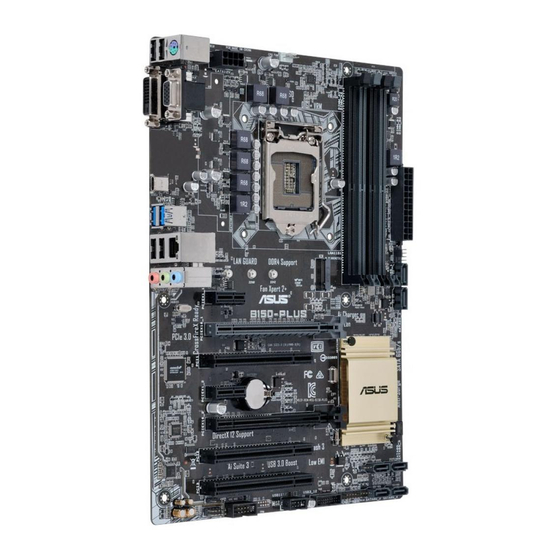Asus Z17 Manuel technique - Page 3
Parcourez en ligne ou téléchargez le pdf Manuel technique pour {nom_de_la_catégorie} Asus Z17. Asus Z17 18 pages. Pin definition

1
Headers
1.
Clear RTC RAM (2-pin CLRTC)
This header allows you to clear the Real Time Clock (RTC) RAM in
CMOS. You can clear the CMOS memory of date, time, and system setup
parameters by erasing the CMOS RTC RAM data. The onboard button
cell battery powers the RAM data in CMOS, which include system setup
information such as system passwords.
To erase the RTC RAM:
1.
Turn OFF the computer and unplug the power cord.
2.
Use a metal object such as a screwdriver to short the two pins.
3.
Plug the power cord and turn ON the computer.
4.
Hold down the <Del> key during the boot process and enter BIOS setup to re-
enter data.
•
If the steps above do not help, remove the onboard battery and short the two pins
again to clear the CMOS RTC RAM data. After clearing the CMOS, reinstall the
battery.
•
You do not need to clear the RTC when the system hangs due to overclocking. For
system failure due to overclocking, use the CPU Parameter Recall (C.P.R.) feature.
Shut down and reboot the system, then the BIOS automatically resets parameter
settings to default values.
2.
RTC Battery header (2-pin BATT_CON)
This connector is for the lithium CMOS battery.
3.
Chassis intrusion header (4-1 pin CHASSIS)
This header is for a chassis-mounted intrusion detection sensor or
switch. Connect one end of the chassis intrusion sensor or switch cable
to this connector. The chassis intrusion sensor or switch sends a high-
level signal to this connector when a chassis component is removed or
replaced. The signal is then generated as a chassis intrusion event.
By default, the pin labeled "Chassis Signal" and "Ground" are shorted
with a jumper cap. Remove the jumper caps only when you intend to use
the chassis intrusion detection feature.
Motherboard Pin Definition
CLRTC
PIN 1
BATT_CON
VBAT
GND
PIN 1
CHASSIS
1-3
